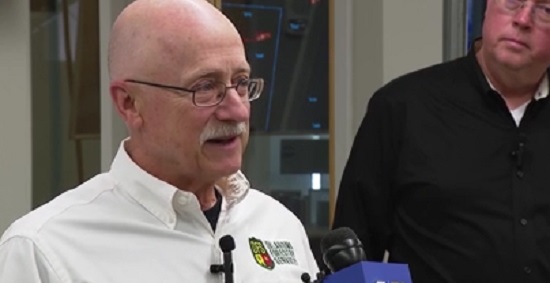Enid, OK – Nearly two weeks after catastrophic wildfires ravaged Oklahoma, the state’s forestry chief has stepped down from his position. Mark Goeller, who had served as the Oklahoma State Forester and Director of the Oklahoma Forestry Service since 2018, resigned following criticism of the state’s response to the historic fires.
Governor Kevin Stitt voiced his dissatisfaction with the way the Oklahoma Forestry Service handled the wildfires that broke out on March 14. The fires, fueled by record-breaking winds and low humidity, led to the destruction of more than 170,000 acres of land and hundreds of homes, including the governor’s own property.
Goeller, who had more than four decades of experience in wildfire management, faced scrutiny from Stitt, who expressed that the state’s response to the fires had been insufficient. “He’s the head of the forestry department and we had a horrible, horrible wildfire in the state of Oklahoma,” Governor Stitt remarked. “I didn’t think they did a really good job.”
The March wildfires, deemed a historic event, came with extreme weather conditions. Rick Smith, the Warning Coordination Meteorologist for the National Weather Service in Norman, explained that the weather conditions were “unprecedented,” with winds and dryness not seen in decades. Despite early coordination and preparation by the National Weather Service and Oklahoma Forestry Service, including pre-positioning equipment and dispatching super scooper planes, the sheer intensity of the fires left little room for intervention until weather conditions changed.
Smith noted that, in some cases, firefighters and officials had to wait for the weather to improve before making significant progress on controlling the flames. “While it was well forecast, there’s only so much you can do to prepare for an event like this,” Smith explained.
Despite the challenges, the lack of a statewide burn ban during the period of heightened fire risk raised further questions. When asked for clarification about the governor’s concerns with the wildfire response and why a burn ban was not issued, the governor’s office did not provide an immediate response.
During part of the wildfire response, Senate Pro Tempore Lonnie Paxton acted as governor while Stitt was out of state. Paxton stated that he was in contact with Stitt, but that decisions regarding personnel changes, including Goeller’s resignation, were ultimately up to the governor. “This is the governor’s decision, whether he wants to keep people in certain positions or not,” Paxton said. “I have not talked to the governor about it.”
The Oklahoma Department of Agriculture, Food, and Forestry confirmed that Goeller’s resignation will officially take effect on Monday. A spokesperson for the department expressed appreciation for Goeller’s long tenure, which spanned over 40 years, noting his commitment to wildland fire response and the state’s forestry industry.
“Mark Goeller has been a dedicated public servant for over 40 years,” the spokesperson said. “His leadership in wildfire response in our state and to Oklahoma’s forestry industry is greatly appreciated, and I wish him the very best in the future.”
The wildfires and their aftermath have left many questions about the state’s preparedness and response, especially given the severity of the conditions. However, experts continue to stress that certain natural disasters are difficult to predict and control, no matter the resources available.

